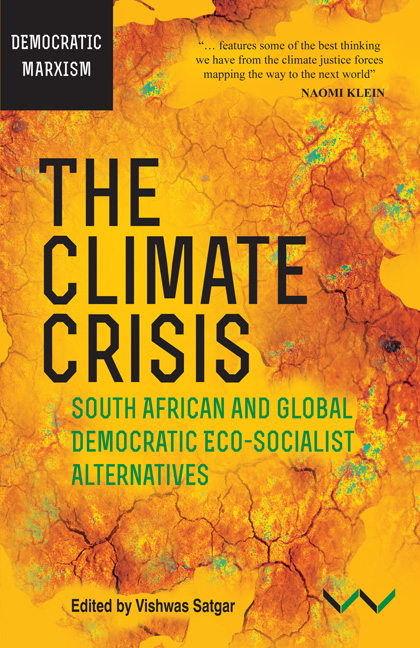Book contents
- Frontmatter
- Contents
- Tables and Box
- Acknowledgements
- Acronyms and Abbreviations
- Chapter 1 The Climate Crisis and Systemic Alternatives
- PART ONE THE CLIMATE CRISIS AS CAPITALIST CRISIS
- PART TWO DEMOCRATIC ECO-SOCIALIST ALTERNATIVES IN THE WORLD
- Chapter 4 The Employment Crisis, Just Transition and the Universal Basic Income Grant
- Chapter 5 The Rights of Mother Earth
- Chapter 6 Buen Vivir: An Alternative Perspective from the Peoples of the Global South to the Crisis of Capitalist Modernity
- Chapter 7 Challenging the Growth Paradigm: Marx, Buddha and the Pursuit of ‘Happiness’
- Chapter 8 Ubuntu and the Struggle for an African Eco-Socialist Alternative
- Chapter 9 The Climate Crisis and the Struggle for African Food Sovereignty
- PART THREE DEMOCRATIC ECO-SOCIALIST ALTERNATIVES IN SOUTH AFRICA
- CONCLUSION
- Contributors
- Index
Chapter 6 - Buen Vivir: An Alternative Perspective from the Peoples of the Global South to the Crisis of Capitalist Modernity
from PART TWO - DEMOCRATIC ECO-SOCIALIST ALTERNATIVES IN THE WORLD
Published online by Cambridge University Press: 05 June 2019
- Frontmatter
- Contents
- Tables and Box
- Acknowledgements
- Acronyms and Abbreviations
- Chapter 1 The Climate Crisis and Systemic Alternatives
- PART ONE THE CLIMATE CRISIS AS CAPITALIST CRISIS
- PART TWO DEMOCRATIC ECO-SOCIALIST ALTERNATIVES IN THE WORLD
- Chapter 4 The Employment Crisis, Just Transition and the Universal Basic Income Grant
- Chapter 5 The Rights of Mother Earth
- Chapter 6 Buen Vivir: An Alternative Perspective from the Peoples of the Global South to the Crisis of Capitalist Modernity
- Chapter 7 Challenging the Growth Paradigm: Marx, Buddha and the Pursuit of ‘Happiness’
- Chapter 8 Ubuntu and the Struggle for an African Eco-Socialist Alternative
- Chapter 9 The Climate Crisis and the Struggle for African Food Sovereignty
- PART THREE DEMOCRATIC ECO-SOCIALIST ALTERNATIVES IN SOUTH AFRICA
- CONCLUSION
- Contributors
- Index
Summary
We are currently facing a crisis that threatens not only the survival of our civilisation and humans as a species, but that of life on our planet as a whole. At the same time, the exploitation-based approach to development is facing its own limits. This is evidenced in the ever-increasing pace of natural destruction, deepening forms of oppression and the global resurgence of totalitarian and fascist approaches to social organisation. Can we continue to simply accept this trajectory as inherent to modern capitalism? Or have we drifted off too far and lost control of the juggernaut of capital accumulation and scientific development? Historically, powerful critical voices have come out of Latin America, calling for resistance against the exploitative and devastating capitalist world regime imposed over our people. Currently, these efforts have resulted in a deep reinterpretation of reality, based on the lived knowledge of ancestral indigenous nations and peoples of Abya Yala (Our America, as José Martí used to call it). Although these critical alternatives have been marginalised from the conventional discourse, they re-emerge in these times of crisis.
These alternative societal constructs are expressed in the constitutions of Ecuador (2008) and Bolivia (2009) through concepts such as buen vivir (Spanish), sumak kawsay (Kichwa) and suma qamaña (Aymara). There are similar notions among diverse indigenous people, such as the Mapuche (Chile– Argentina), the Guarani (Paraguay, Brazil, Argentina and Bolivia) and the Kuna (Panama and Colombia). This worldview is also found in the Mayan tradition in Guatemala and among the diverse indigenous groups that inhabit Chiapas in Mexico. Beyond Abya Yala, there are many other inclusive philosophies across the world, which, in one way or another, are related to the search for living well, or buen vivir. This includes the concept of ubuntu in Africa and svadeshi, swaraj and apargrama in India.
BUEN VIVIR: AN ALTERNATIVE VISION OF CIVILISATION FROM THE WORLD's PERIPHERY
In recent years, in the context of post-development discussions, attempts to rebuild the conceptual structure, practices, institutions and discourses of development have multiplied. While some focus on criticising specific approaches to development, others propose an alternative to the concept of development. It is in this second category that we find the approaches of buen vivir and sumak kawsay.
- Type
- Chapter
- Information
- Climate Crisis, TheSouth African and Global Democratic Eco-Socialist Alternatives, pp. 131 - 147Publisher: Wits University PressPrint publication year: 2018



